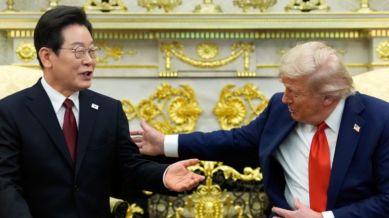South Korea differs from Trump, says can’t pay $350 billion to US in cash for tariff deal
The two countries reached a handshake agreement in July to cut US tariffs on South Korean goods to 15 per cent from 25 per cent.

South Korea cannot pay $350 billion in cash to the United States (US) under a tariff deal proposed by President Donald Trump and is looking for an alternative, a top presidential aide said on Saturday.
The two countries reached a handshake agreement in July to cut US tariffs on South Korean goods to 15 per cent from 25 per cent. At the time, Seoul pledged $350 billion in investment for US projects, saying the funds would come through loans, loan guarantees, and equity.
Trump, however, said this week that South Korea would provide the money “upfront.”
South Korea’s National Security Adviser Wi Sung-lac told Channel A News: “The position we’re talking about is not a negotiating tactic, but rather, it is objectively and realistically not a level we are able to handle. We are not able to pay $350 billion in cash.”
Talks to formalise the agreement have stalled, with South Korean officials opposing US demands for control over the funds.
On Thursday, Trump said tariffs were bringing in large sums of money, adding: “We have in Japan it’s $550 billion, South Korea’s $350 billion. That’s upfront.”
Last week, South Korean President Lee Jae Myung told Reuters that such a payment could destabilise the country’s economy, which has foreign exchange reserves of about $410 billion. He said safeguards such as a currency swap would be needed to avoid a crisis.
Wi, the top aide to Lee, said: “Nobody would question South Korea’s position on the feasibility of the amount if it were required as a cash payment upfront. We’re discussing alternatives.”
He added that Seoul aims to conclude the deal with Washington at the Asia-Pacific Economic Cooperation (APEC) summit, which South Korea will host next month and Trump is expected to attend.